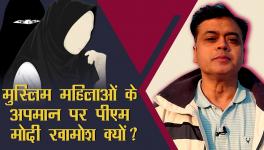Advertisements and Majoritarian Morality: A Dangerous Precedent

Dabur withdraws Karwa Chauth ad featuring same-sex couple
In light of yet another recent instance of an advertisement being pulled down due to outrage fomented by culturally right-wing politicians against their supposed ‘objectionable’ content, AMAN GARG examines the legal mechanisms in place that those aggrieved by the content of advertisements can resort to, and explains why free speech must be only regulated by constitutional morality, rather than the tenuous notion of public morality.
———–
Last week, FMCG company Dabur faced flack and pulled down its advertisement depicting a same-sex couple celebrating the Hindu festival of Karwa Chauth, hours after Madhya Pradesh Home Minister Narottam Mishra threatened legal action, claiming the advertisement to be “objectionable”. With this Dabur joined an extending list of companies who lately have had to roll back commercials, due to backlash over their content.
Prominent fashion retailer FabIndia also had to withdraw a marketing capsule about its upcoming festival range after it was criticized by the right wing for ‘defacing’ their festival of Deepavali by labelling its festive catalogue as Jashn-e-Riwaaz (Urdu for ‘celebration of tradition’).
Tanishq, a jewellery business owned by the Tata Group, was compelled to pull a commercial featuring an interfaith couple during a baby shower hosted for a Hindu bride by her Muslim in-laws. A Holi commercial by Surf Excel, in 2019, drew similar backlash from certain quarters because it displayed youth from two different faiths enjoying the festival of colours.
Currently, anything, it appears, can become the basis for hurting ‘sentiments’ of a certain section of the society, and the consistency with which this is unfolding now is concerning.
This piece questions this rising “majoritarian morality” and how it creates a chilling effect on free speech. It also discusses the extent of protection guaranteed to the advertisement industry by our legal system.
Statutory regulations
There is at present no standard agency or regulatory body in place in India for advertising content. The Indian advertising industry is governed by Advertising Standards Council of India (ASCI), a non-statutory tribunal founded in 1985 with the goal of establishing a self-regulatory framework to ensure ethical advertising activities through its Code for Self-Regulation of Advertising Content in India (ASCI Code).
The union government acknowledged ASCI’s growing importance in overseeing advertising practises in India, and amended Rule 7 of the Cable Television Networks Rules, 1994 in August 2006 to make the ASCI Code mandatory for television ads.
Anyone who deems that the advertisements are inaccurate, deceptive, offensive, or discriminatory can file a complaint under the ASCI Code. The complaints are then reviewed by an autonomous Consumer Complaints Council, and if proven objectionable, the aforementioned Rule 7 stipulates that any commercial that denigrates any race, caste, or ethnic group and strives to instigate people to commit crimes, cause unrest, or is obscene or vulgar can be prohibited. Moreover, Section 16 of the Cable Television Networks (Regulation) Act, 1955 sanctions punishment on the advertisers as well.
In the present case, not a single complaint was made to ASCI with regard to the Karwa Chauth advertisement nor was any suo motu action taken by the body. However, the promoter was pressurized to remove the advertisement as a state government minister found the lesbian couple performing the ceremony “objectionable”. This bullying was even referred to as “public intolerance”, and quite rightly so, by a sitting Supreme Court Judge.
The controversy over the advertisement also seems perplexing, given that this isn’t the first time two women have been shown as a couple on screen. Fashion e-commerce company Myntra ran a commercial a few years ago in which two ladies in a live-in relationship were preparing to meet their families.
The issue here appears to be that a same-sex couple, particularly two women, is being showed participating in a religious custom whose very foundation is to celebrate gendered heterosexual marital relationships. Ordinarily, neither circumstance should be objectionable, particularly because homosexuality is no longer a crime in India.
Beyond social morality
Free speech is one of the most fundamental tenets of democracy, sans which a society will crack under its fissures, and it can only be curtailed on the grounds listed in Article 19(2) of the Indian Constitution. The most probable excuse for restricting same-sex couple ads is the ground of ‘morality’.
Social or public morality means the popular sentiment prevalent at a particular point of time, whereas Constitutional morality “embraces within its sphere several virtues, foremost of them being the espousal of a pluralistic and inclusive society” by instilling a culture of fraternity amongst a heterogeneous population.
Questions regarding morality and what is socially or culturally acceptable or what is not are essentially subjective in nature, which is why the only standard that must dictate the law is the idea of ‘constitutional morality’. Of late, the use of ‘constitutional morality’ has become indispensable than ever before in interpretation of the Indian Constitution by the judiciary.
Also read: Why Same-Sex Marriages Must be Judged at the Constitutional Altar
Interestingly, in the Sabarimala case, then Chief Justice of India Justice Dipak Misra, in the majority opinion observed:
“The term ‘morality’ occurring in Article 25 (1) of the Constitution cannot be narrowed down and be viewed in terms of what it means to be an individual, a section or religious sect. In cases where there is a violation of fundamental rights the term ‘morality’ naturally implies constitutional morality and the Constitutional Courts decision must be in conformity with basic principles of constitutional morality that emanates from the constitution itself.” (emphasis supplied)
In a separate but concurring judgment, Justice D.Y. Chandrachaud too observed that “Constitutional morality must have a value
of permanence which is not subject to the fleeting fancies of every time and age. … [C]onstitutional morality must [be] firmly rooted in the
fundamental postulates of human liberty, equality, fraternity and dignity.”
As a result, Constitutional morality cannot be side-lined at the behest of social morality, and only constitutional morality can be permitted to permeate into the rule of law, as this serves as a check against the authoritarianism of the majority.
LGBTQ+ people are citizens of India, have equal rights and protection of law, and possess the fundamental right to express themselves through their personal and religious decisions. The guise of social morality cannot be exerted to undermine even a single person’s fundamental right, and a manoeuvre to impose a homogenized and standard ideology across society would be a blatant infringement on constitutional morality.
Also read: Sabarimala judgment: The limits of ‘expanding’ law
Rising intolerance and its chilling effect
Companies, at their most basic level, simply advances a message to sell their product. Unlike governments, corporations cannot thrust anything on the populace. If an individual doesn’t quite agree with or appreciate a brand’s commercial or its content, they have the choice of skipping the advertisement, or objecting openly and presenting their view. However, when the difference in opinion is carried to its extremity, including threatening violence, the aggrieved party crosses the threshold of intolerance and starts harassing the brand to submit to their line of thought. This undoubtedly paves way to self-censorship and stifling brand creativity and innovation, resulting in a chilling effect on the free flow of ideas and thoughts in a democracy.
What is even more distressing was Dabur’s apology and withdrawal of the commercial. Ultimately, an unconditional apology completely devalues the very progressive idea that it purportedly carries. While it is understandable to rethink their stand due to the unfortunate circumstance, a huge corporation like Dabur permitting politicians to intimidate them creates a dangerous precedent.
(Aman Garg is an undergraduate student of Law pursuing B.A., LL. B. (Hons.) from the Gujarat National Law University, Gandhinagar. The views expressed are personal.)
Get the latest reports & analysis with people's perspective on Protests, movements & deep analytical videos, discussions of the current affairs in your Telegram app. Subscribe to NewsClick's Telegram channel & get Real-Time updates on stories, as they get published on our website.
























